

| Archeology of Desire ~ Adrien Sina, curated by Sarah Wilson, 2004 |

 The Archeology of Desire relates to the future and to archaic memories conjugated across times and civilisations. Adrien Sina presents an Erotic Museum which analyses our particular Zeitgeist. He combines the world-wide repertoire of his own photographs with the anonymous archive of the web, which offers his 'Archeology' complementary layers of reality. The personal meets the universal, the individual eye meets the anonymous image. Boundaries blur between curatorial, art-historical and artistic practice. A question is explored as though several artists with different viewpoints were collaborating. Like Michel Foucault in the Archeology of Knowledge, Sina proceeds forensically. We are invited to decipher a corpus of work, structured like a discourse, with constant underlying principles. A visual semiotics is at play: provocative and exotic, his captured moments also contain tenderness and delicacy. Yet Sina's archaeological practice retains its exteriority to its subjects; it does not reconstitute original emotions, experiences, communications. The flows of desire are checked by critical distance, by the frames of the image and the grids of display. |

|
Adrien Sina : Archeology of
Desire
Sarah Wilson
|
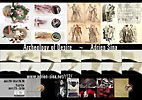 |
 |
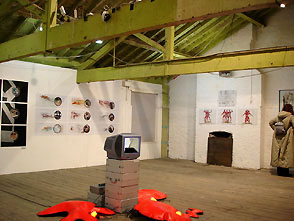 |
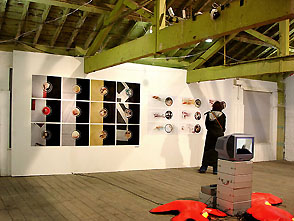 |
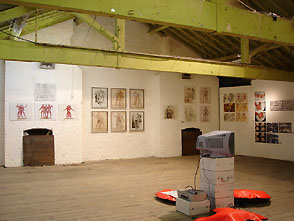
|
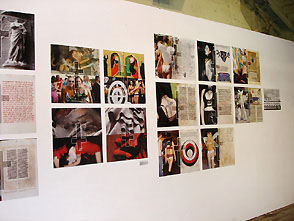
|
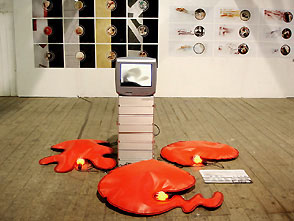 |
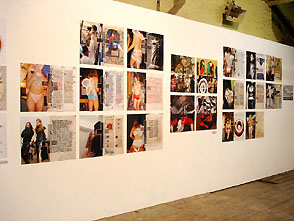 |
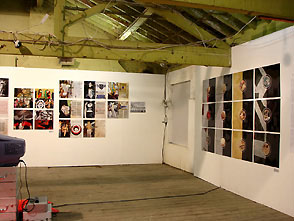 |
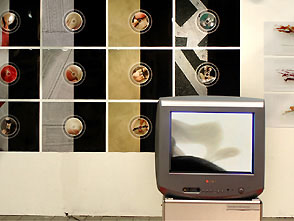 |
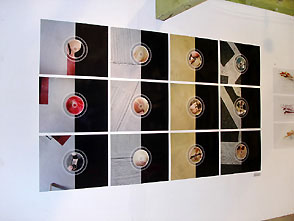 |
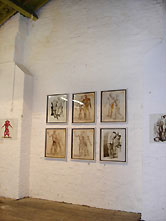 |
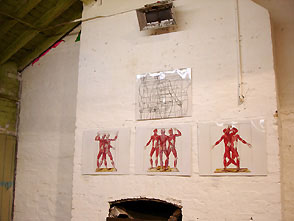 |
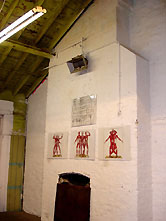 |
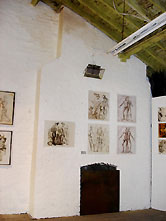 |
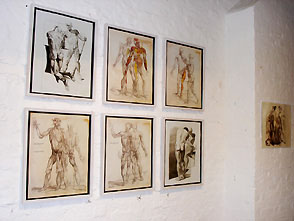 |
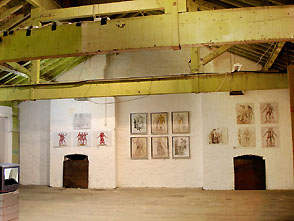 |
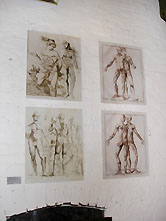 |
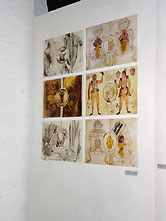 |
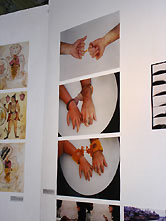 |
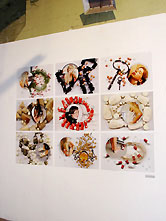 |
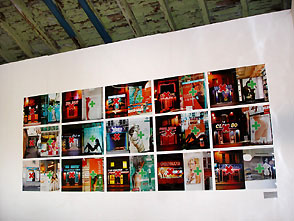 |
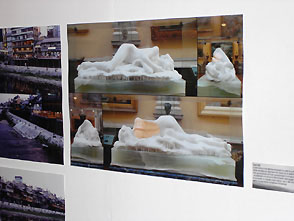 |
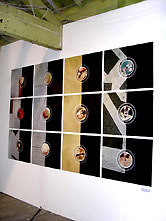 |
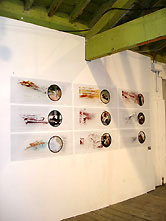 |
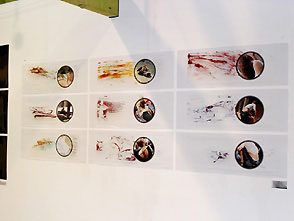 |
 |
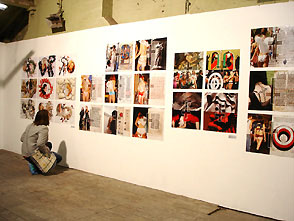 |

Dark Angels / Bright Devils (2004)
Feathers tattooed on a girls' shoulder: a memory of angels' wings. Gothic lives, not as broken treasures accumulated within museum vaults, but as a universal youth culture where a dark language speaks love, rebellion and romantic desire cloaked in black. The crucifix has acquired other rituals, a semantic field in which it speaks to its inverted other; the monks who calligraphed and decorated coloured manuscripts scripts were tormented by the devil with sexual visions; his work and theirs lives again today on the skin.
Intimate Landscapes, Public Spaces (1999-2003)
An extending informel art of desire, exquisite landscapes of colour originated deep in the sexes of once-identified women: smears on glass made in the 1970s, forgotten in the cellars of a Brussels clinic. Each smear is unique; the medical gesture and the choice of stain becomes an imaginary calligraphed portrait of a woman - doubly inspired by her outward being and her body at its most intimate. To rediscover this imaginary being we pass from one intimacy to others, different scenes, public scenes. In the medallions, a new generation makes love on the grass: private in public, caresses in the sun oblivious of the chain of desires which link their whispered words to a deeper Archeology, to loves longdisappeared, unreproducible - yet transformed into the flesh of new generations.
Anatomy of Touch (2003-04)
Strangely autoerotic, anatomical man with his exposed muscles and intestines, his poses snatched from far-off mythological scenes, functions as a figure of scientific instruction in a blank space. Repeated from various viewpoints, the figure turns from frontal to profile view. Anatomical woman sits improbably, her belly peeled open, a star-like fruit, showing the foetus within. Through superimposition, Sina restores strange narratives of passion, alerting us to the expressively of a hand reaching out to touch, a finger placed upon a sex. 'Science' rediscovers the language of desire which provoked the first anatomical questions; neutral backgrounds become an intersubjective field traversed by beckoning gestures which control a space now pregnant with meaning. Hypotheses of homosexual encounter broach forbidden territory, and are given graphic power with the intermingling of yearning looks and delicately touching hand.
Sexuality and Rituals of Childbirth (2002-03)
From East to West, the representations of pregnancy and gestation in the medical maps of the body are fraught with the cultural transmission of codes and styles - and so often anomalous due to taboos, censure, blind spots. And while science has a history of extraordinary progress, the physiological processes of the act of love have remained until so recently intuitive or hypothetical, a mystery.
Pills and Pearls (2002-03)
Pills, pearls, placebos, the inside and the outside again play their roles in the search for well-being and the embellishments of desire, bursting on the flesh in colours and forms, Pleasure meets the vanitas; the obsession to please at any price leads to a melancholy which slowly infiltrates the whole of society.
Transfer x + (2003-04)
French Transfer. From Pharmacy to Sex-Shop and back again. The live shows round Les Halles or Pigalle surrounded their black-curtained facades with light-box promises: skins of every colour: chocolate, blonde, eyes closed, sexes open, which tumbled onto dank, night-time pavements. Not and more in the France of Nicolas Sarkozy and Jacques Chirac's new right. The sex shop facades are blank; but the pharmacies have become a riot of flesh, arching bodies, sweat and sea-spray, creams applied, oils massaged over golden pores. The visual transfer has a contrapuntal rhythm in this series; once again the moral message is reduced to a comically manichaean order of Good versus Evil. The State clean-up to protect minors from images of nudity is powerless to contain the overflow of desire as it spreads to reconquer new territory.
Snowdrift (2003)
At a point of extinction for this female figure and, inexorably for her creator, the ice child merges her cold body with melting snow. Edward Onslow Ford's Snowdrift, 1901, his valedictory sculpture of marble, agate and lapis lazuli, cased in glass, is pierced by the gazes of an old woman and a young girl - two sculpted heads, at the Lady Lever Art Gallery, Port Sunlight. A sensory geography is recast here for new spectators as a topography of desire, proposing a space in which lovers may project memories of the body. Perfections and imperfections of the loved object.
The Space between One and One (1994-2002)
This project originated by observing the delicate geometric divisions between public and private space as couples progressively crowded the Kamo river bank and its western borders near Gion, Kyoto, in 1994. As night advanced, couples arrived from the bars, night clubs and and restaurants of the old quarter, and sat in twos, creating a chain kilometres long, the Shijo Ohashi bridge at a focal point in the centre. Zeno's paradox was silently observed: spaces divided in half as each couple arrived... The space between each couple too is a space between one and one, traversed by the gesture of a hand, a word, or a sense of emptiness: intimacy is always a question of two solitudes. A measurable space, and subsequently an abstract field of emotion, vibration and silence. A spontaneous urban choreography where the geometries of the space between one and one are in constant flux.
Torture Garden (2003-04)
From the Paris of François Villon to Octave Mirbeau and his Jardin des Supplices - thence to the cellars in gay quarters of the city where rites of passage and orgiastic pain are prolonged in a world or leather and chains on concrete: the reemergence of the archaic structures of eroticism. Torture with its medieval erotics is transferred to the world of urban sophisticate: the moment of the most intense jouissance or unbearable frustration is represented minimally, a floor of stone and darkness.
Intersubjective Jewellery (2003)
Joy and joyaux - the same archaeological roots. Desire locked in? A paradox. To be together and bound in gold - but hand-cuffed, finger-cuffed? A delicate play on materiality and intersubjectivity : the joy of desire and its chains. The symbols of linkage are also symbols of prohibition, like homosexual marriage - a subject very prominent in debates on the left and right in France today.
Volcano (video, 5min, 2004) Dark eruptions, liquid plumes, white nights.
Adrien Sina trained as an architect at Paris-Villemin and the Architectural Association in London with Bernard Tschumi. He was introduced to performance by Jochen Gerz. His work on pre-Socratic philosophers has been essential for his art and theoretical practice, and he has published two interviews with philosopher Paul Virilio. He has exhibited extensively, from Kyoto Future City Art Museum, 1994, to 'TransArchitectures 03' NAi-Rotterdam, 1998, and at various institutions in France. Among his curatorial projects are Fugitive Fluctuations for the Espace d'Art Yvonamor Palix in Paris in 1995, Fugitive Fluctuations mutation 2 (Ferme du Buisson Contemporary Art Centre, Noisiel 1996) and the performance-based Tragédies Charnelles, (Château de Pommery, Reims, 2000). He conceived and edited special issues of La Mazarine on Tragédies Charnelles + Fluctuations Fugitives and Immanences Spatiales, the same year. In 2003 he was advisor to Tate Liverpool for Art, Lies and Videotape: Exposing Performance. He has taught extensively in Europe and at the Pasadena Art Center and Sci-Arc in Los Angeles. His experimental programme was most interestingly tested in the volcanic French island territory of the Réunion (Indian Ocean, 2001-2) where issues of interracial relations and collective memory became the subject of student videos, performances and works with new media. He will be presenting pioneer futurist artist Valentine de Saint-Point at RoseLee Goldberg's Performa Biennale, New York, October 2005. Adrien Sina lives and works in Paris.

Adrien Sina
Archeology of Desire
4 Steward Street
Spitalfields
London E1 6AL
(+44) 07903876522
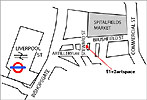


| © Adrien Sina |
